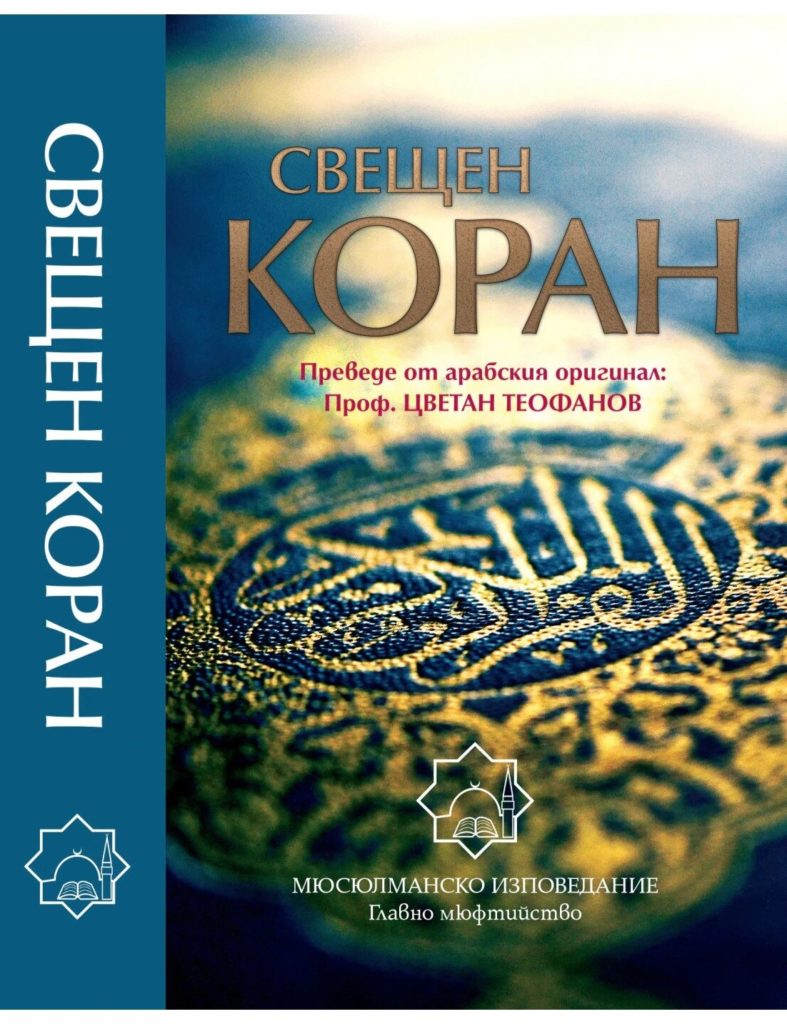The Bulgarian language is spoken by at least eight million people (including more than half a million Muslim speakers) and has played an especially interesting role in the history of Qur’an translation in the Balkan area. As the Balkans have historically been a space where Slavic culture encounters Turkish influence, the “Bulgarization” of the Qur’an not only had religious significance, but also impacted on nationalistic and political discourses in the region. The majority of Bulgarian Muslims (locally called “Turks”) live in the south of the country, and continue to use Turkish as a main language of communication and religious sermon, while the Pomaks (Bulgarian speaking Muslims who live in Bulgaria, northeastern Greece and mainly northwestern Turkey), Roma and other local ethnic groups mostly use Bulgarian. That is why early Christian missionary translations of the Qur’an the first half of twentieth century, made into Bulgarian on the basis of other European interpretations from German, French and English, were perceived as a challenge to their identity by local Turkish-speaking Muslims.
This tension still exists at some level today, and the struggle for language rights is still an important issue for the Turkish population in the country. It is against this background that the first Muslim-authored translation into Bulgarian, translated by Muhammad Shamsuddin between 1986 and 1989, was published in 1991 by an amateur press (“samizdat”, “self-publishing practice”), followed in 1993 by an “interpretation” produced by a committee headed by Mufti Nedim Gandzijev which appeared in a limited run.
The next Qur’an translation to be published in Bulgarian was “Prevod na Sveshtenia Koran”(“Translation of the Holy Qur’an”), authoredby the well-known Bulgarian scholar of Arabic and Islamic Studies Tsvetan Teofanov, which is the focus of today’s blogpost. First published in 1997 with the support of the Saudi “Al-Taybah” foundation, a second revised edition appeared in 1999. Since then it has been reprinted at least five times by other Bulgarian publishers, the Muftiate of Bulgaria and, finally, the Turkish Directorate of Religious Affairs. The “authorized” status of this translation has made it quite popular, and it is widely available not only in mosques and libraries, but also on numerous web-sites and apps. Teofanov’s conversion to Islam following the completion of his translation, which he has discussed in various interviews, has also raised its profile among both Muslims and non-Muslim readers.
Teofanov, born in 1952, embarked on his academic path at Sofia University, soon after which he moved to the University of Baghdad and, later, Cairo University. His PhD thesis (granted by Moscow State University in 1987) was dedicated to the works of the famous early Islamic poet Abū l-ʿAtāhiyya, and his habilitation thesis was on classical Arabic poetry (2001). In addition to his Qur’an translation, Teofanov (now professor at Sofia University) is known for his monographs and studies on the medieval Middle East, as well as his own poetical works; he also seems to be the only Bulgarian scholar to have translated a hadīth collection, the Riyāḍ al-ṣāliḥīn by al-Nawawī.
The preface to Teofanov’s Qur’an translation introduces Bulgarian readers to the most important concepts of the Qur’an, and also presents a brief biography of the Prophet Muḥammad and the early history of Islam. Tsvetan Teofanov also addresses modern controversies over issues such as religious tolerance in Islam, jihād, and Islam and science. The translation itself reflects the great scholarly and academic experience of its author. Its style seems to be partially influenced by Kraĉkovskij‟s Russian translation (known for its literality), but as rather quite successful “grammatical translations” does not include passages with a literal translation nor the paraphrases. Careful attention has been paid to the wording of the verses, and all exegetical additions are set off within brackets. The translation is rendered in the present-day Bulgarian, which allows the translator to avoid the use of archaic vocabulary, and he preserves only a few Arabic terms, both factors which make his translation accessible for both Muslim and non-Muslim audiences.
Any additional commentary is attached to the translation in the form of footnotes, written in a simplified syntax and following mainstream Sunni interpretations. Although no classical commentaries are mentioned by name in the text, Teofanov has revealed in some interviews that he used the Sunni exegeses of al-Ṭabarī, Ibn Kathīr and Sayyid Quṭb, and when explaining asbāb an-nuzūl (“occasions of revelation”) in his commentaries, he relied primarily on “Ṣaḥīḥ al-Bukhārī”. For theological verses, he tends to provide a literal translation, but adds some clarification based on mainstream Sunni doctrine (as in the case of Q 20:5: “Vsemilostiviya, Koĭto se vŭzdigna [bezpodoben] na Trona”, “The All-Merciful, Who ascended [being incomparable] to the Throne”). The same is true of some verses that deal with ritual and social issues, where Tsvetan Teofanov explicates them with reference to Sunni perspectives, such as the abrogation of “mutʿah” (“temporary”) marriage practice (discussed in a footnote to Q 4:24). Overall, his approach has resulted in a text that is suitable to either be read as a whole, or quoted in academic, religious or popular writing.
Mykhaylo Yakubovych


